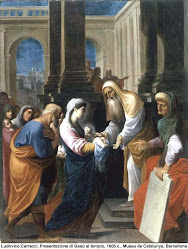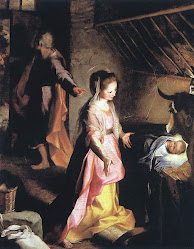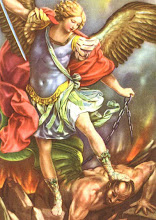The Teaching of Christ
Taking Christ's own dogmatic and moral teaching, we may divide it into (a) what He did not reveal but only reaffirmed, (b) what He drew from obscurity, and (c) what He added to the sum total of belief and practice.
(a) Christ reaffirmed, purified, and confirmed the Jewish theology, both moral and dogmatic. He asserted the spiritual nature of the Godhead (John, i, 18; iv, 24), and insisted on the importance of worshipping Him in spirit, i.e. with more than merely external rites. And he exacted the same right dispositions of heart in the whole of God's service, showing how both guilt and merit depend on the will and intention (Matt., v, 28; xv, 18).
He recalled the original unity and indissolubility of the marriage-tie. He brought into prominence the immortality, and hence the transcendent importance, of the human soul (Matt., xvi, 26), as against the heresy of the Sadducees and the worldliness of the Jews in general. In all these points He fulfilled the Law by showing its real and full significance.
(b) Taking the great central precept of the Old Dispensation — the love of God — He pointed out all its implications and made clear that the doctrine of the Fatherhood of God, so imperfectly grasped under the law of fear, was the immediate source of the doctrine of the brotherhood of men. He never tired of dwelling on the loving kindness and the tender providence of His Father, and He insisted equally on the duty of loving all men, summing up the whole of His ethical teaching in the observance of the law of love (Matt., v, 43; xxii, 40).
This universal charity He designed to be the mark of His true followers (John, xiii, 45), and in it, therefore, we must see the genuine Christian spirit, so distinct from everything that had hitherto been seen on earth that the precept which inspired it He called "new" (John, xiii, 34).
Christ's clear and definite teaching, moreover, about the life to come, the final judgment resulting in an eternity of happiness or misery, the strict responsibility which attaches to the smallest human actions, is in great contrast to the current Jewish eschatology. By substituting eternal sanctions for earthly rewards and punishments, He raised and ennobled the motives for the practice of virtue, and set before human ambition an object wholly worthy of the adopted sons of God, the extension of their Father's Kingdom in their own souls and in the souls of others.
(c) Among the doctrines added by Christ to the Jewish faith, the chief, of course, are those concerning Himself, including the central dogma of the whole Christian system, the Incarnation of God the Son. In regard to Himself, Christ made two claims, though not with equal insistence.
He asserted that He was the Messias of Jews, the expected of the nations, Whose mission it was to undo the effects of the Fall and to reconcile man with God; and He claimed to be Himself God, equal to, and one with, the Father. In support of this double claim, He pointed to the fulfillment of the prophecies, and He worked many miracles.
Most modern rationalists (Harnack, Wellhausen, and others) acknowledge that Christ from the beginning of His preaching knew Himself as the Messias, and accepted the various titles which belong in the Scripture to that personage — Son of David, Son of Man (Dan., vii, 13), the Christ (see John, xiv, 24; Matt., xvi, 16; Mark, xiv, 61, 62). In one passage (a very significant one), He applies the name to Himself;
"But this is eternal life: That they may know thee, the only true God, and Jesus Christ, whom thou hast sent" (John, xvii, 3).
Christ took up the burden of the preaching of His precursor and proclaimed the advent of the Kingdom of God, or the Kingdom of Heaven, a conception already familiar in the Old Testament [Ps. cxliv (A. V., cxlv), 11-13], but furnished with a wider and more varied content in the words of Christ.
It may be taken to mean, according to the context, the Messianic Kingdom in its true spiritual sense, i.e. the Church of God which Christ came to found, wherein to store up and perpetuate the benefits of the Incarnation (cf. The parables of the wheat and the tares, the dragnet, and the wedding feast), or the reign of God in the heart that submits to His sovereignty (Luke, xxvi, 21), or the abode of the blessed (Matt., v, 20 etc.).
It was the main topic of His preaching, which was occupied in showing what dispositions of mind and heart and will, were necessary for entrance into "the Kingdom", what, in other words, was the Christian ideal. Regarded as the Church, He preached the Kingdom to the multitude in parables only, reserving fuller explanations to private intercourse with His Apostles (Acts, i, 3).
The last great dogma which we learn from the life, preaching, and death of Christ is the doctrine of Redemption. "For the Son of Man also came not to be ministered unto but to minister, and to give His life a redemption for many" (Mark, x, 45).
The sacrificial character of His death is clearly stated at the Last Supper;
"This is my blood of the new testament, which shall be shed for many unto remission of sins" (Matt., xxvi, 28).
And He ordained the perpetuation of that Sacrifice by His Disciples in the words;
"Do this in commemoration of me" (Luke, xxii, 19).
On the moral teachings of Christ. Duty was the principal motive in the Old Dispensation; in the New this was sublimated into love. Men were taught to serve not on account of the penal ties attached to non-service, but on principles of generosity. "What things are pleasing to Him, these do I always" (John, viii, 29), and by action even more than by word Christ taught the lesson of voluntary self-sacrifice. Never till His time were the Evangelical counsels — voluntary poverty, perpetual chastity, and entire obedience — preached or practised.
From no previous moral code, however, exalted, could the Beatitudes have been evolved. Meekness and humility were unknown as virtues to the heathen, and despised by the Jew. Christ made them the ground-work of the whole moral edifice. To realize what new thing Christ's ethical teaching brought into the world and put within the grasp of everyone, we have only to think of the great host of the Christian saints. For they are the true disciples of the Cross, those who imbibed and expressed His spirit best, who had the courage to test the truth of that Divine paradox which forms the substance of Christ's moral message;
" He that shall wish to save his soul shall lose it, but he that shall lose his soul on my account shall find it" (Matt., xvi, 25; cf. Mark, viii, 35; Luke, ix, 24; xvii, 33; John, xii, 25).
That was the course He Himself adopted — the way of the Cross — and His disciples were not above their Master. Self-conquest as a preliminary to conquering the world of God — that was the lesson taught by Christ's life, and still more by His passion and death.
http://www.spaceandmotion.com/christianity-christian-jesus-christ.htm
ARTICLES OF THE CHRISTIAN RELIGION
mercoledì 26 marzo 2008
Iscriviti a:
Commenti sul post (Atom)





















Nessun commento:
Posta un commento